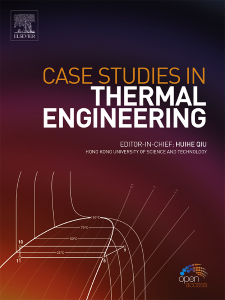Investigation of the cooling effect of wind on rooftop PV power plants
IF 6.4
2区 工程技术
Q1 THERMODYNAMICS
引用次数: 0
Abstract
This study investigates the cooling of PV panels installed on the roof of a 5.9 MW power plant in Bursa, Turkey, under varying wind conditions. Meteorological measurements were conducted during the summer period to analyse the cooling effects. When wind speed differences were below 0.5 m/s, the cooling effect on the PV panels ranged between 2 and 3 °C. However, when the wind speed differences approached 1 m/s, the cooling effect increased up to 7 °C. At lower wind speeds, winds blowing from behind the panels provided better cooling, whereas side winds offered improved performance as wind speed increased. Due to the roof slope and the minimal gap between the panels and the roof, winds from behind were less effective, as they could not penetrate the back of the PV panels. Side winds, on the other hand, faced no difficulty in flowing over the panel surfaces but lost their cooling effect as they passed along the long rows of panels. These findings suggest that during the design phase of PV power plants, high wind speed locations should be prioritized, and optimal configurations should be implemented to ensure uniform wind access to all PV arrays.
风对屋顶光伏电站冷却效应的研究
本研究调查了安装在土耳其布尔萨一座 5.9 兆瓦发电厂屋顶上的光伏电池板在不同风力条件下的冷却情况。在夏季进行了气象测量,以分析冷却效果。当风速差低于 0.5 米/秒时,光伏板的冷却效果为 2 至 3 °C。然而,当风速差接近 1 米/秒时,冷却效果增加到 7 °C。在风速较低时,从电池板后面吹来的风能提供更好的冷却效果,而随着风速的增加,侧面的风能提供更好的冷却效果。由于屋顶的坡度以及电池板与屋顶之间的缝隙很小,从后面吹来的风效果较差,因为它们无法穿透光伏电池板的背面。另一方面,侧风在流经电池板表面时没有遇到困难,但在经过长排电池板时失去了冷却效果。这些研究结果表明,在光伏电站的设计阶段,应优先考虑风速较高的地点,并实施优化配置,以确保所有光伏阵列都能均匀受风。
本文章由计算机程序翻译,如有差异,请以英文原文为准。
求助全文
约1分钟内获得全文
求助全文
来源期刊

Case Studies in Thermal Engineering
Chemical Engineering-Fluid Flow and Transfer Processes
CiteScore
8.60
自引率
11.80%
发文量
812
审稿时长
76 days
期刊介绍:
Case Studies in Thermal Engineering provides a forum for the rapid publication of short, structured Case Studies in Thermal Engineering and related Short Communications. It provides an essential compendium of case studies for researchers and practitioners in the field of thermal engineering and others who are interested in aspects of thermal engineering cases that could affect other engineering processes. The journal not only publishes new and novel case studies, but also provides a forum for the publication of high quality descriptions of classic thermal engineering problems. The scope of the journal includes case studies of thermal engineering problems in components, devices and systems using existing experimental and numerical techniques in the areas of mechanical, aerospace, chemical, medical, thermal management for electronics, heat exchangers, regeneration, solar thermal energy, thermal storage, building energy conservation, and power generation. Case studies of thermal problems in other areas will also be considered.
 求助内容:
求助内容: 应助结果提醒方式:
应助结果提醒方式:


